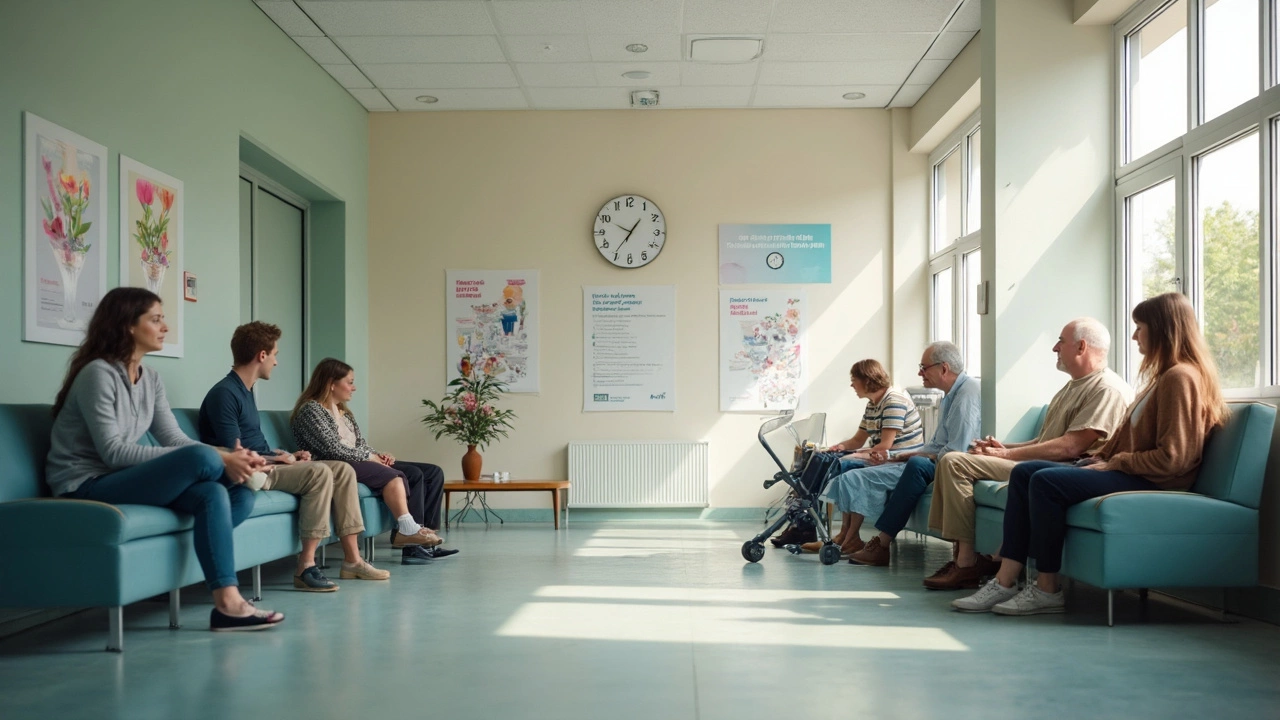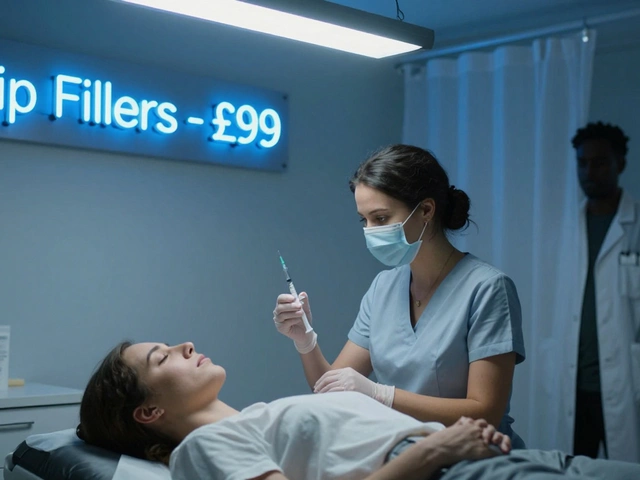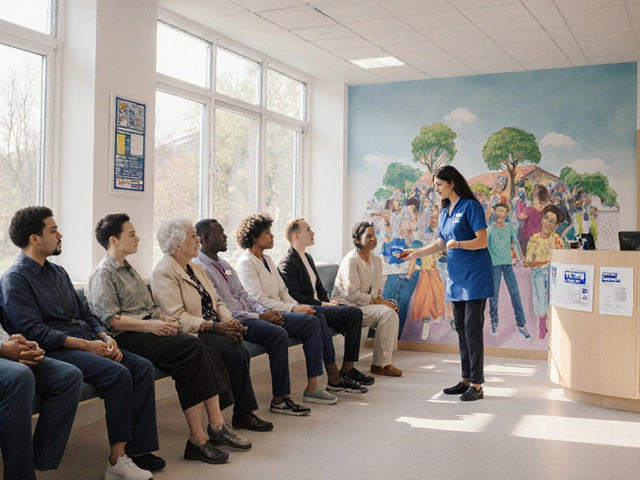If you’ve ever booked a GP appointment, you know the drill – get in, say your piece, and hope you remember everything before they call in the next patient. But is there a set rule for how long you actually get in that room?
The standard GP session in the UK usually runs for about 10 minutes. That’s right, just 10 minutes on average. If you blink, you could miss it. This isn’t some random number either – it’s become the norm, pressed by heavy patient loads and strict schedules. But don't think it’s one-size-fits-all. Some practices might stretch to 15 minutes, especially for longer-term issues, mental health chats, or more complex discussions.
If you’re worried you’ll run out of time, you’re not alone. Try jotting down your symptoms and any questions before you go. It’s a lifesaver when nerves hit, and you forget the main thing you needed to say. Bring a list, be honest and upfront – doctors appreciate it, and you’ll leave feeling like you got what you came for.
- The Basics: How Long is a Standard GP Session?
- Why Appointments Aren’t All the Same
- What Happens If You Need More Time?
- Making the Most of Your Minutes
- Why GP Sessions Feel So Rushed
- How to Get Extra Help If You Need It
The Basics: How Long is a Standard GP Session?
If you search for GP session length, you’ll see the number “10 minutes” everywhere. That’s not by accident. In the UK, most GP surgeries set their slots at about 10 minutes per patient. It’s meant to let doctors see lots of people in a day, but let’s be honest—it can feel like a race against the clock.
This time frame isn’t just in your head. According to data from the NHS published in 2024, the average GP appointment time is just under 10 minutes. That includes everything: you walk in, sit down, explain your problem, get examined, discuss next steps, and head out. It’s all packed into that small window.
| Country | Average GP Appointment Time |
|---|---|
| UK | 9.2 minutes |
| Germany | 7.6 minutes |
| Sweden | 22.5 minutes |
| France | 16.0 minutes |
As you can see, patients in the UK really do get one of the shortest appointments in Europe. It’s not anyone’s idea of luxury time, but it’s how things are for now. Some practices offer longer appointments—usually around 15 or even 20 minutes for special cases, but you usually need to ask in advance or have your GP recommend it.
If you’re thinking about “GP near me” and want to know what to expect, check your surgery’s website or just ask the receptionist when you book. Some clinics are experimenting with group sessions or video calls to squeeze more out of the same limited hours.
Why Appointments Aren’t All the Same
Not all GP session lengths are created equal. What you actually get in your appointment depends on a bunch of things. For starters, practices set their own slots, often between 8 and 15 minutes. New patient health checks? They might get double the time. A straightforward cold? That’ll be closer to 10 minutes, if that.
If you’re booked in for something routine, like repeat prescriptions or a simple check-up, don’t expect more than a quick chat. But if you’re there to talk about mental health or a chronic condition, reception might offer a longer slot, especially if you mention your needs in advance. It’s not about playing favourites, it’s about matching time with what helps most.
Here’s a quick look at GP appointment times for different needs in the UK:
| Type of Appointment | Average Session Length |
|---|---|
| Standard adult consultation | 10 minutes |
| New patient registration/health check | 20 minutes |
| Annual reviews (chronic illness) | 15-20 minutes |
| Mental health support | 15-20 minutes |
| Children’s checks or vaccinations | 10-15 minutes |
Sometimes, you’ll see double slots (20 minutes) available for things like joint injections or smears, but you usually have to ask, or a GP needs to book it for you after reviewing your situation.
Another thing—the time you wait and the time you get in the room can feel pretty different. Clinics can get behind, especially in winter when everyone seems to catch something. So if you’re waiting, don’t panic; it probably means someone ahead needed that extra time.
Bottom line: your GP session length isn’t set in stone. It changes with your needs, what you tell the staff, and how busy the day is. If in doubt, always tell reception why you need to see the GP. That’s the quickest way to get a slot that actually fits.
What Happens If You Need More Time?
So you’re sitting in the GP office and you realise ten minutes just isn’t enough. You might be dealing with more than one health problem, or maybe your issue needs a deeper chat. What’s actually supposed to happen?
Here’s the thing: most GP session length rules in NHS practices focus on a single problem per appointment. If you show your doctor a long list, they’ll usually say you need to book another slot. It’s not them being harsh, it’s a safety thing. GPs are trying to avoid missing something important because things get rushed.
But what if you do need longer? Ask your surgery when you call or book online if they offer double appointments. A lot of clinics do, especially if you say upfront that your issue is complicated or you need extra time for mental health support, chronic illness, or language barriers. Don’t be shy – receptionists have heard it all and would rather know your needs ahead of time.
- Tell the receptionist you think you’ll need longer than the standard 10 or 15 minutes.
- Be specific if it’s for things like reviewing a long medication list, discussing test results, or talking about ongoing pain.
- If you feel rushed during your GP appointment, speak up. Ask if you can book a follow-up for anything unresolved.
Here’s something a lot of people don’t know: in the UK, recent reports show about one in five patients (18%) have felt their appointment was too short. But practices are under pressure—NHS England stats from 2024 show GPs are averaging over 36 appointments a day.
| Reason for Needing More Time | Can You Get a Longer Appointment? |
|---|---|
| Chronic health conditions | Often, yes—ask for a double slot |
| Mental health | Usually possible if you explain beforehand |
| Language/interpreter | Most practices allow extra time |
| More than one problem | May need another appointment |
If you feel your issue hasn’t been sorted, don’t stress about coming back. Plenty of patients need more than one GP consultation to get to the bottom of things. It’s always okay to ask for the time you need.

Making the Most of Your Minutes
When you only get about 10 minutes for your GP session length, you’ve got to make every second count. Nobody wants to leave the room, only to remember the real reason they went in. The good news? There are a few easy tricks to squeeze the most out of your GP appointment time and leave feeling sorted.
- Write your symptoms and questions down. If your mind goes blank around doctors (yep, happens to the best of us!), a written list keeps you focused. Start with your main concern.
- Be up front as soon as you sit down. GPs appreciate you being direct. Say, ‘I have three things but this one is my priority.’ That way, if only one thing gets tackled, you know it’s the big one.
- Bring any paperwork or medications. If you’re on prescribed meds, bring your list or the actual packaging. If you’ve tried over-the-counter stuff, mention it. Save time, avoid guessing games.
- Use your phone (the right way). You can use your mobile for quick notes, photos of your symptoms, or a calendar of your headaches. But don’t get distracted scrolling – keep it to what the doctor needs.
- Avoid ‘by the way’ questions at the end. It’s tempting, but dropping a surprise big issue (‘by the way, I have chest pain’) as the appointment wraps up isn’t ideal. Always mention important stuff first.
One study found patients who prep with a list get more done in their ten minutes. And here’s a pro tip: if you need more time, ask up front – the receptionist might be able to book you a double slot if it’s a GP near me with flexible scheduling. Not all clinics do this, but you’ll never know if you don’t ask.
If you like a bit of data to back things up, here’s a quick look at how the UK compares to a couple of other countries for average GP consultation time:
| Country | Average GP Appointment (minutes) |
|---|---|
| UK | 10 |
| Australia | 15 |
| USA | 13-16 |
So, compared to elsewhere, that British ‘quick in and out’ approach really is a thing. There’s no harm in being prepared – not just for your own peace of mind, but to help your GP help you.
Why GP Sessions Feel So Rushed
Ever felt like your GP appointment time barely covers the basics? You're not imagining it. The main reason GP session length feels tight is simple: demand. GPs in the UK see more patients per day than ever before. Most GPs schedule around 30-40 patients in a typical working day. That means, with breaks and admin tasks squeezed in, staying on time becomes a marathon.
Here’s a quick look at how appointment timing usually works:
- Most GP sessions are set at 10 minutes per patient.
- Some surgeries in areas with older or sicker populations might offer 12-15 minutes.
- Longer slots are usually reserved for mental health, complex chronic illness, or when the patient has a lot to discuss.
| Year | Avg GP Appt Length (mins) | Avg Patients per GP per Day |
|---|---|---|
| 2015 | 10.2 | 33 |
| 2023 | 9.4 | 37 |
No matter how efficient your GP is, sick notes, urgent cases, or patients who turn up late can throw the whole schedule out of whack. Plus, there’s paperwork. A survey from Pulse magazine found that UK GPs spent nearly one-third of their day on admin, emails, and forms. Less time in the room with patients means every minute really counts.
On top of all that, the NHS pays close attention to waiting times—so surgeries work hard to keep sessions moving. Nobody wants to be left in the waiting room for ages, but that does mean your face-to-face time often feels short and sweet (or just short!). If you think you’ll need longer than the usual slot, mention it to the receptionist when booking – sometimes they can give you a double appointment.
How to Get Extra Help If You Need It
If you leave your GP session feeling like you didn’t get through even half your concerns, you’re not alone. Loads of people feel rushed, especially when sessions are so short. But don’t just accept it—there are ways you can ask for more help or time.
First up, if you know your issue is complex or you have multiple things to discuss, tell the receptionist when you book. Many practices in the UK now offer longer appointments if you’re upfront about what’s going on. Sometimes, you can request a double slot, especially if it’s something like a mental health issue or several ongoing health problems.
Here are some practical steps if you need extra time with your GP near me:
- Book a double appointment: When you call or use the online system, mention if you’ll need extra time. Receptionists usually have some leeway with the schedule.
- Ask for a follow-up: If you run out of time, don’t try to cram everything in—just ask for another slot. GPs would rather see you again than rush everything and miss something important.
- Email or use online tools: More practices are offering online forms or secure emails to follow up with questions. It saves everyone time and you get answers straight from the doctor or a clinical team member.
- See a nurse or healthcare assistant: For things like blood pressure checks, injections, or basic reviews, the nurse can help, opening up more time with your GP for the big stuff.
If communication is a barrier or you need support—like a translator, a carer, or BSL interpreter—definitely mention this when booking. Practices are required by law to make adjustments and can book extra time if you need it.
Here’s something you might find surprising: a 2023 survey by NHS Digital showed that almost 1 in 5 patients felt their appointment wasn’t long enough for what they wanted to cover. That’s over 25 million people a year! But around 40% said they’d managed to get another session within a week. This means GPs know the system can be tight, and there are ways to work around it if you ask.
Bottom line—don’t struggle through on your own or leave feeling short-changed. Speak up, explain your needs, and work with your surgery to get the help you deserve. Your health shouldn’t fit a timer.




